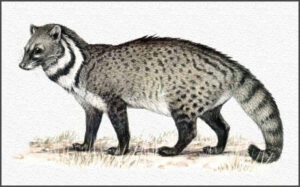
Moon Desk: A civet is a meat-eating mammal. In general, a civet has a somewhat cat-like appearance with a small head, long body, and long tail, although a civet is not in fact a cat. Its muzzle is long and often pointed, rather like that of an otter or a mongoose. Excluding its tail, a civet ranges from about 17 inches to 28 inches long, and weighs between three to 10 pounds. There are several species of civets; they are native to most of Africa, the Spanish peninsula, southern China, and Southeast Asia.
Civet oil is often requested for import into the United States for use in the perfume industry.
Civets are usually solitary and live in tree hollows, among rocks, and in similar places, coming out to forage at night. Except for the arboreal palm civets, such as Paradoxurus (also known as toddy cat because of its fondness for palm juice, or “toddy”) and Nandinia, civets are mainly terrestrial. The Sunda otter civet (Cynogale bennetti), the African civet (Civettictis civetta), and the rare Congo water civet (Genetta piscivora) are semiaquatic. Civets feed on small animals and on vegetable matter. Their litters usually consist of two or three young.
The anal glands of civets open under the tail into a large pouch in which a greasy, musklike secretion accumulates. This secretion, known as civet, is used by the animals in marking territories. The secretion of the small Indian civet, or rasse (Viverricula indica), and of the Oriental civets (Viverra) is employed commercially in the manufacture of perfume. In addition, coffee beans fermented within and excreted from the digestive tracts of civets in the Philippines and Indonesia are sometimes used to enhance the taste of coffee.
The IUCN Red List of Threatened Species lists several civets in danger of extinction; among these are the Malabar civet (Viverra civettina), which lives in the Western Ghats of India, and the Sunda otter civet, which is native to the Malay Peninsula, Sumatra, and Borneo.







